
Despite the high temperature and the early time, last Saturday, the 93rd Primary School of Athens at Neos Kosmos was full of life. But what was going on? Following the seminar on climate protection and energy saving practices at school of secondary education teachers, a seminar for the primary education teachers was about to be held.
According to the framework of the program “OPEN SOCIETIES AND SCHOOLS IN CLIMATE PROTECTION AND ENERGY TRANSITION (CLIMATE SCHOOL Be.At)”, a total of 200 teachers from 65 primary, secondary, high school and technical education schools of Athens and neighboring areas will be trained so that they will be able to take action and make research in their schools to raise awareness of the educational community and change behaviors to achieve energy saving.
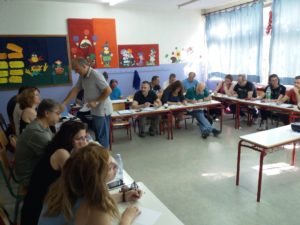
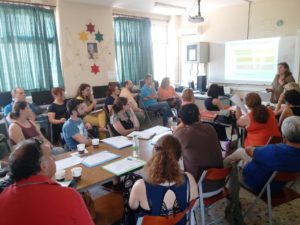
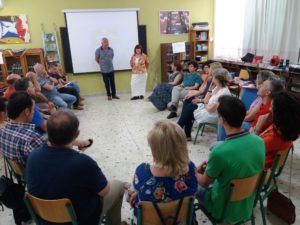
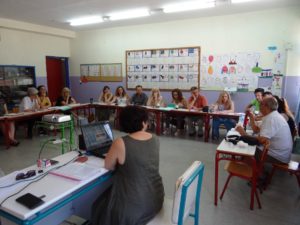
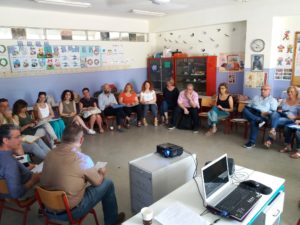
The bell rang at 8.30am and the 10 trainers of the seminar welcomed their trainees at the classrooms in groups of 21-25. In total there was trained a gender balanced group of 105 teachers. All of them had personal desire and willingness to participate in the project. They were really enthusiastic about the topic of energy efficiency and climate protection since it was their first time working for that in such a practical, coherent and structured way. Comparing to recycling or other environmental projects that they had already run in their schools, they expressed their enthusiasm to guide their students to implement such a practical and research based program that will lead to measurable results.
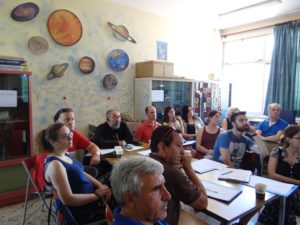
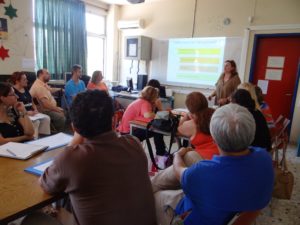
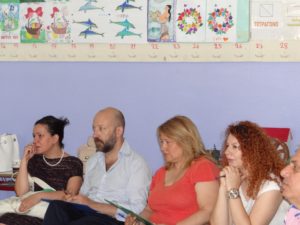
The teachers left very positive comments about the quality of the 6-hour training, the overall structure of the project and the training material. They characterized the project as: ambitious, challenging, interesting, manageable, organized, innovative, methodical, well-structured, promising, well-designed. Their expectations are more concentrated on practical applications and technical knowledge, and they expressed interest to develop synergies with other institutions and similar initiatives in Greece in order to achieve better results and a sustainable implementation of the outputs of the program.

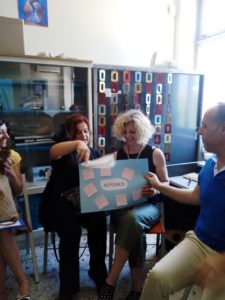
The training focused mainly on the following topics:
- Theoretical input on energy and climate change.
- Familiarization with methods of creating an action plan for each school in order to save energy and raise the awareness of the school community in climate change.
- Familiarization with methods of coordinating energy-saving actions (organizing an energy group, energy council, energy tour at the school, etc.).
- Implementation of energy saving soft measures at school.
- Introduction to recording and processing data methods.
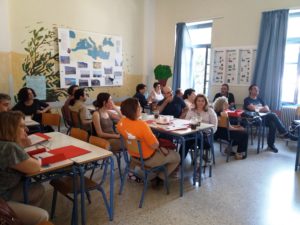
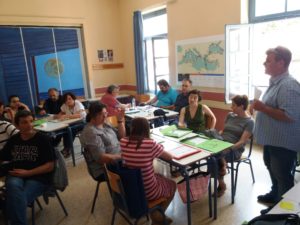
training-on-climate-protection
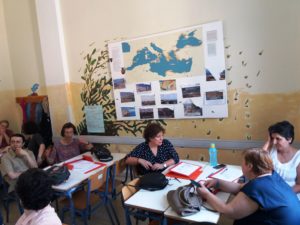
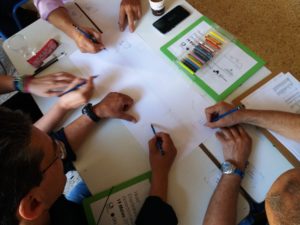
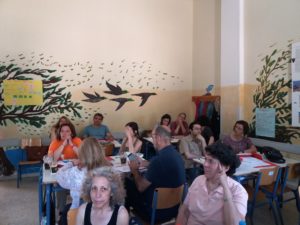
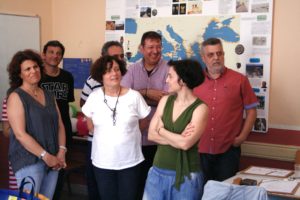
training-on-climate-protection
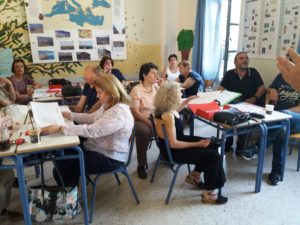
The methodological process of the implementation of the program has been structured on the basis of the following 10 steps:
- Define an energy group for the school
- Define an energy council for the school
- Organize an energy tour of the energy council
- Study of the energy situation of the school (raise awareness on climate change issues)
- Energy tour at the heating room of the school with the energy team
- Data processing – Action Plan for energy saving and raise awareness on climate change
- Create a campaign to promote the implementation of the action plan in the school community
- Apply energy saving measures
- Make proposals for changes to the building’s infrastructure
Evaluate overall implementation of the program
The implementation of the program will be followed by a research framework. Aim of the research is to track the pilot implementation of the program and together with the research data that will be collected articulate a more comprehensive study that will be used by the Municipality of Athens in order to act in the direction of energy saving and promoting more sustainable practices in all the municipal schools.
The 19 trainers that implemented the 2 training seminars of the 200 teachers had been previously trained in the principles, methodology and objectives of the program “OPEN SOCIETIES AND SCHOOLS IN CLIMATE PROTECTION AND ENERGY TRANSITION (CLIMATE SCHOOL Be.At)” on a 4 days (30 hours) extended seminar that also took place in Athens during 12th -15th April 2018 (“Training of the Trainers” seminar). The “Training of the Trainers” seminar was implemented by a team of Greek experts and teachers together with trainers of the German Independent Institute for Environmental Issues (UfU) with the coordination of the social cooperative ”Wind of Renewal /Anemos Ananeosis” and the Municipality of Athens.
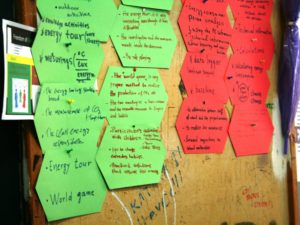
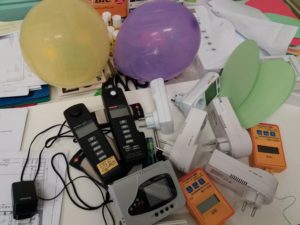
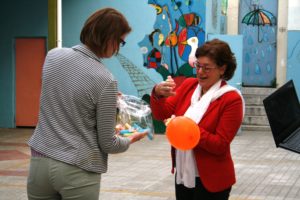
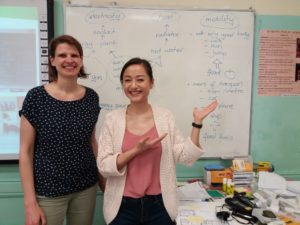
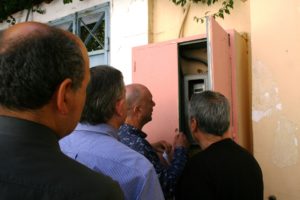
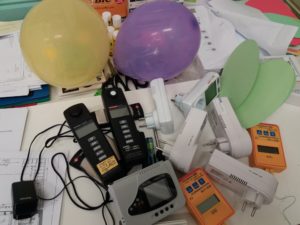
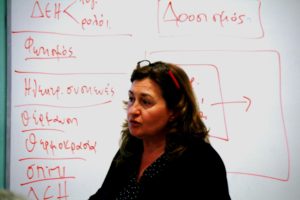
The 200 teachers from both primary and secondary education will participate in a total of 24 hours of training (6 hours in the spring of 2018, followed by 14 hours in September and 4 hours in May 2019). The trained teachers will work for the implementation of the program in the school year 2018-2019, starting from September 2018.
The program “OPEN SOCIETIES AND SCHOOLS IN CLIMATE PROTECTION AND ENERGY TRANSITION (CLIMATE SCHOOL Be.At)” constitutes a collaboration between the Municipality of Athens, the educational community, the Social cooperative “Anemos Ananeosis / Wind of Renewal”, the German citizens initiative Respekt für Griechenland e.V. / Respect for Greece (Berlin) and the German Unabhängiges Institut für Umweltfragen / UfU. It aims to the mobilization of the educational community, local communities and municipalities for climate protection and energy transition as well as to the energy efficiency of the schools with the substantial participation and collaboration of the teachers, students, parents and local authorities. The program is under the auspices of the Greek Ministry of Education
The program was evaluated and selected for funding by the European Climate Initiative (EUKI), which is a project financing instrument by the German Federal Ministry for the Environment, Nature Conservation and Nuclear Safety (BMUB). It is the overarching goal of the EUKI to foster climate cooperation within the European Union in order to mitigate greenhouse gas emissions. It does so through strengthening cross-border dialogue and cooperation as well as exchange of knowledge and experience.

